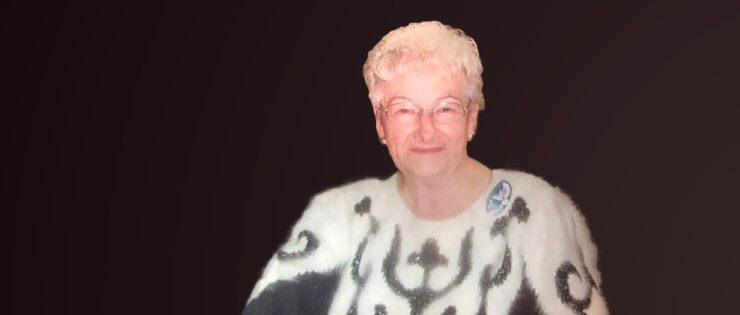
Anita Brisson learned that she had a condition called Factor XIII deficiency in 2013. She decided to participate in research that could help other patients with this very rare blood disease.
Anita Brisson was doing her usual chores in her home near Embrun, Ontario in March 2013 when one of the veins in her tongue burst. As her tongue swelled, the 82-year-old started having trouble breathing.
“When I arrived at The Ottawa Hospital, I couldn’t speak,” said Brisson. “I had to respond to questions in writing.”
It wasn’t the first time that she’d had a mysterious injury. Brisson was making meatballs just before Christmas 2009 when the repetitive task of pushing the meat into a spoon broke one of the veins in her arm.
“I had a bump the size of an orange,” she remembered. “It took six months to heal.”
Her condition was a puzzle to Emergency Department staff when she was first seen at the Civic Campus. All her blood tests came back normal, suggesting to hematologist Dr. Alan Tinmouth that she had a very rare disease called Factor XIII deficiency.
“Our bodies need Factor XIII to form and maintain blood clots,” said Dr. Tinmouth, who is also a scientist at The Ottawa Hospital and the University of Ottawa. “Mrs. Brisson didn’t have enough of this protein, so blood pooled in her tissues instead.”
While Dr. Tinmouth did tests to diagnose this rare condition, Dr. Manoj Lalu, an anesthesiologist and clinical scholar at The Ottawa Hospital, determined that Brisson needed an urgent procedure to help her breathe through her swollen throat. Then, Brisson was sent to the Intensive Care Unit where anesthesia resident Dr. Kira Tone helped care for her. After receiving injections of Factor XIII for four days, her swelling went down and she was able to breathe normally.
Because there was little information on patients like Brisson, Drs. Tinmouth, Lalu and Tone decided to do a systematic review of all the literature to find the best ways to detect and treat Factor XIII deficiency. With Brisson’s permission, they also published an article on her specific case. She wanted to participate so she could help others with this rare condition.
“I can’t complain,” she said. “There are people who are much worse off than me.”
Today, Brisson is in good health. She reads le Droit, takes daily walks and is president of l’Union culturelle des Franco-Ontariennes. Every month a nurse comes to give her another transfusion of Factor XIII, and she continues to be followed by the Ottawa Regional Adult Bleeding Disorders Program.
“I have every confidence in the doctors and staff at The Ottawa Hospital,” said Brisson. “If I wasn’t brought to the Civic Campus, it’s possible that I wouldn’t be here today.”

Support patient care and research at
The Ottawa Hospital


 To reset, hold the Ctrl key, then press 0.
To reset, hold the Ctrl key, then press 0.